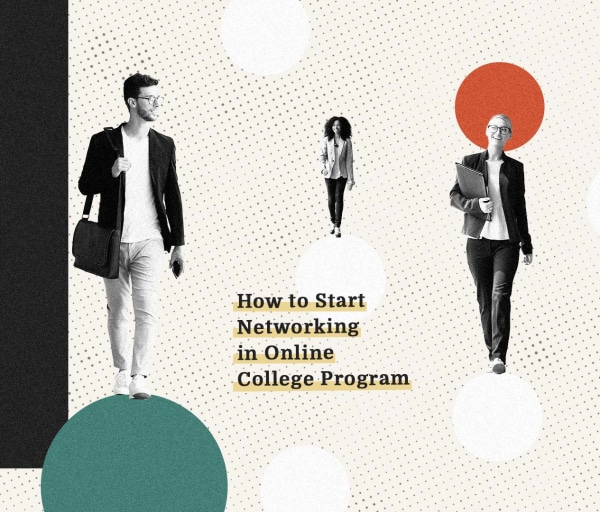Networking is one of the most important ways to land a job after school. But what's the best way to network if you're in an online college program?
Online programs offer significant perks for students — for one, the flexible schedule makes it easier to balance school with work or family. Plus, a distance learning format means students can attend a top program in their specialty area without relocating.
But do online students miss out on networking opportunities? All those "how to network" guides seem to ignore distance learners who can't stop by a networking event after lecture.
According to multiple studies, somewhere between 50-80% of job candidates land their positions thanks to networking. And that makes sense — many job openings aren't posted publicly, so it's all about who you know. As a result, networking plays a huge role in launching a career.
Fortunately, online students can also use networking to increase their chances of finding jobs after earning their degrees. Career services, virtual events, social media, and alumni associations all help distance learners network during their online programs.
Tips for Networking in an Online Program
Networking is all about making a personal connection. But that connection can take place virtually as well as in person.
Online learners sometimes need to think creatively about networking opportunities. However, the best online programs offer a wealth of ways to build a strong network while in school. Here are some tips for how to network in an online college program.
-
Reach Out to Career Services
Your college's career services office has one job: Helping students network and connect with employment opportunities. Career services can help online learners find internships in their local area, recommend employers who hire graduates from the program, and connect students with recent grads.
Career services offices can also make the job application process easier by maintaining placement files for students. These files contain everything applicants need, like a resume, official transcript, and even recommendation letters.
Many colleges with significant online programs offer specialized online student career services. Some academic departments also offer niche career support services. For example, many MBA programs have dedicated staff to help students prepare for the business world.
-
Get to Know Your Professors
Professors do more than teach classes and assign grades. They can also be a great networking resource. Professors know about career paths in their field and can share tips on starting a career or going to graduate school. They're also a great source of recommendation letters when submitting applications.
How should online students connect with their professors? Start by attending virtual office hours to make a personal connection with your professor. Keep an eye out for online departmental events that professors might attend. And follow up with professors even after taking their classes, particularly for professors in your major.
-
Connect With Alumni
Some students choose colleges based on their alumni networks. Powerful alumni networks can help recent grads get their feet in the door with employers. They can also offer helpful tips for transitioning from school into the workforce, since they made the same journey themselves.
Brick-and-mortar schools that offer online programs typically welcome all graduates, regardless of learning format, into the alumni association. That means distance learners can connect with alumni from both online program and in-person programs. Note that alumni associations often have membership fees.
Online students can link up with alumni by attending virtual events and contacting the association directly. Many alumni associations offer discounts for recent grads, so the investment can pay off in other ways, too.
-
Use Social Media
We've all heard horror stories of the many ways to lose a job because of social media — but done right, social media can be a great networking tool.
Online learners should regularly update their LinkedIn profile with info from their program, news about their internship, and successful projects. Use LinkedIn to network with people in your field; reach out to people who have jobs that interest you and offer to buy them coffee in exchange for their insights.
Future job hunters can also think broader than LinkedIn. If you're in a field like public relations, business, or even tech, developing a professional brand on sites like Twitter, Instagram, and Facebook can make a difference.
Connecting with professionals on any social media site can pay off down the line — but make sure to tread carefully when it comes to posting potentially unprofessional content.
-
Find Virtual Networking Events
College students might think of cocktail napkins and conference rooms when they picture a campus networking event, but today, more and more networking events are taking place online. An online event is a great way to meet a variety of people and find connections relevant to your career aspirations.
Start by looking for virtual events hosted by your college or department. The alumni association, career services office, and other student services offices may host online events. Many colleges also offer online job fairs, which are abundant with networking opportunities.
In addition to events hosted through your college, research local meetups and events in your field. Professional associations, chambers of commerce, and private companies all hold online events that students can often attend.
-
Join School Organizations
Your classmates are a major networking opportunity. Instead of thinking of classmates as competition in the job market, consider them resources. You might all be students now, but someday, you'll all have jobs — and be able to help one another advance.
When you invest in making friends in online college, you can see dividends for years. School organizations are a great way to build relationships with other students. Many colleges offer honor societies in different disciplines with options for online learners, linking students with a wider network.
Outside of academics, simply connecting with students based on shared interests helps build a network that can last long past graduation.
Putting Your Network to Use
Once you've built a network, lean on those connections. If you're in the market for an internship or looking for your first post-graduate job, reach out to people in your network for advice. Alumni, professors, and classmates can all offer information about potential companies, help you prepare for an interview, or provide feedback on a job offer.
And remember that a network goes both ways. Make sure to pay it forward by helping people in your network once you land a job. Consider offering to mentor incoming students in your program or meet with prospective applicants. That way, you'll have an even wider network in a few years.

Genevieve Carlton
Genevieve Carlton holds a Ph.D. in history from Northwestern University. After earning her doctorate in early modern European history, Carlton worked as an assistant professor of history at the University of Louisville, where she developed new courses on the history of science, Renaissance Italy, and the witch trials. Carlton has published five peer-reviewed articles in top presses and a monograph with the University of Chicago Press. She also earned tenure with a unanimous vote before relocating to Seattle. Learn more about Carlton's work at genevievecarlton.com.
Header Image Credit: WestEnd61, Tetra Images | Getty Images
Learn more, do more.
More topic-relevant resources to expand your knowledge.
Popular with our students.
Highly informative resources to keep your education journey on track.
Take the next step toward your future with online learning.
Discover schools with the programs and courses you’re interested in, and start learning today.


